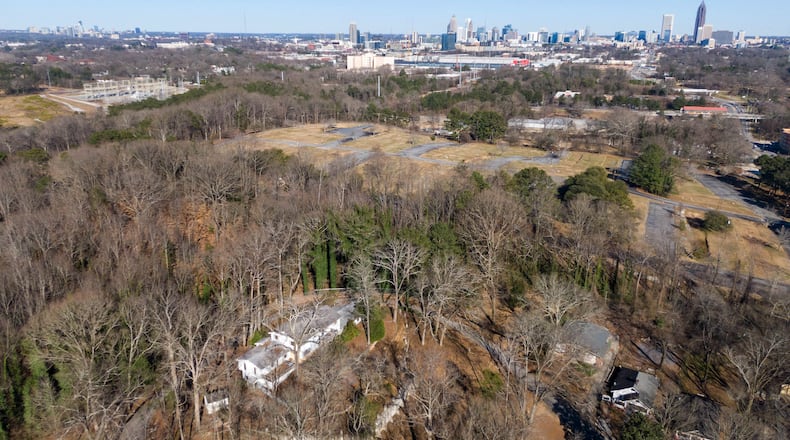Microsoft is moving into the next phase of its plans for building a new campus on Atlanta’s Westside, a massive project sure to have a major impact on a swiftly gentrifying area.
The tech giant last week announced the team that will help plan the 90-acre development along Donald Lee Hollowell Parkway near the Bankhead MARTA station. It also formed a “community advisory council” made up of neighborhood leaders, City Council members and local nonprofits.
It’s all part of Microsoft’s efforts to work with the community, company officials say, so the project benefits the surrounding neighborhoods by including affordable housing and community amenities on the site.
After meeting with community groups and representatives last year, Microsoft will now be expected to deliver on those promises as the project moves into its planning stage — and residents will look to ensure Microsoft holds up its end of the deal.
Microsoft has said it plans to set aside a quarter of the development for affordable housing and other community services though no specifics have been released on what that might entail. There isn’t an exact timetable for the project, but the company said it is a “multiyear” endeavor.
“Our priority is positive, local impact. From the inclusive hiring of local vendors to jobs and affordable housing created for the region, sustainable building solutions, and much more,” Michael Lawings, senior director of Americas Real Estate Operations for Microsoft, said in a statement. “We are excited at the opportunity ahead of us and look forward to playing a larger role in empowering the local community and growing with the city of Atlanta.”
The project is near a future Beltline path and the recently opened Westside Park. In recent years, as the park and Microsoft campus were announced, home prices have skyrocketed in nearby neighborhoods like Grove Park, Center Hill and Bankhead, threatening to push out longtime renters and homeowners struggling with increased rents and property taxes. Some townhomes on Hollowell are now going for over $500,000.
“The house that’s next to me is being flipped. The house across the street from me is being flipped. There’s a lot of change,” said Rolanda Powell, a former neighborhood association president in Center Hill.
The metro Seattle-based tech company bought the property in late 2020 for roughly $150 million, formally announcing a few months later its plans to turn Atlanta into one of its new national hubs.
Credit: HYOSUB SHIN / AJC
Credit: HYOSUB SHIN / AJC
Since then, emotions in the adjacent neighborhoods have ranged from cautious optimism to skepticism to cynicism, fueled by decades of underinvestment on the Westside and broken promises from the city and other corporations.
Some worry Microsoft is only giving the residents lip service about working with them, though the company said its advisory council will provide crucial input. The company is planning three open town hall events “to help ensure transparency and understanding around how feedback is being used to inform campus plans,” Microsoft said in a press release. The first town hall is scheduled for June.
“There’s still ways the community shouldn’t be left behind,” said Eric Harrison, the former chair of the Neighborhood Planning Units that includes the neighborhoods of Bankhead, Hunter Hills and Knight Park/Howell Station. He said Microsoft’s representatives have been “disingenuous” about connecting with residents, especially after he said they didn’t appear during an NPU meeting last year.
Harrison said residents are also looking for clarification on whether Microsoft is seeking any tax breaks for building the new hub.
In a statement, a Microsoft spokesperson didn’t close the door on future tax breaks, saying the company is “committed to a listen-first, community driven approach to expanding in Atlanta. We apply for incentives where they are generally available to taxpayers and relevant investments under qualifying circumstances.”
Microsoft said it is now planning to meet with the nearby NPUs, as well as the neighborhood associations, about the site design.
Powell said her experience with Microsoft has been positive, adding that they proactively engaged and listened to neighbors before most developers typically do. She and other neighbors hope Microsoft follows through with providing jobs to local residents, and improving safety on busy Hollowell Parkway.
Credit: HYOSUB SHIN / AJC
Credit: HYOSUB SHIN / AJC
TJ Austin, a Grove Park resident, said the project has the chance to bring a lot of positives to the community, especially by offering housing and STEM training. Residents, he said, “want Microsoft to be a good steward and do what they can to really galvanize the people that live here.”
“For the most part people are excited, people are apprehensive,” Austin said. “Most people are afraid of the unknown.”
Microsoft also announced it is partnering with architecture firm Cooper Carry, with urban planning consulting firm APD Urban Planning and Management, sustainability consultants Transsolar and market research consultants Noell Consulting Group. The Integral Group will help out with real estate impact projects, and JLL will lead program management.
Here’s the full list of groups that will be part of the community advisory council:
- Center Hill Neighborhood Association
- Councilmember Dustin Hillis
- Councilmember Byron Amos
- Local Education Partners
- Grove Park Community Church
- Grove Park Foundation
- Grove Park Neighborhood Association
- Grove Park Renewal
- Bankhead/Historic Westin Heights Neighborhood
- Historic Howell Station Neighborhood Association
- Northwest Business Association (NWBA)
- NPU-J
- NPU-K
- Paradise Baptist Church
- PAWKids
About the Author
Keep Reading
The Latest
Featured





